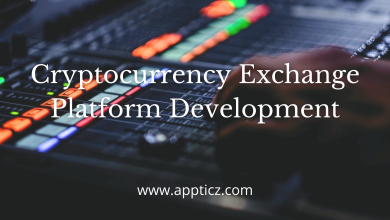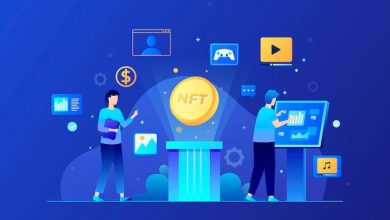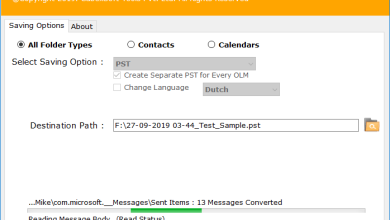Top Blockchains Used in NFT Development

NFTs (non-fungible tokens) have been the talk of the town, and it appears that everyone is familiar with the current trend. The NFT art auction exploded in popularity in 2021, and we’ve seen some astronomically costly NFT purchases, with Beeple’s First 5000 Days presently leading the pack. You’ve undoubtedly also heard of other popular NFTs like CryptoKitties, CryptoPunks, Jack Dorsey’s first tweet, Doge NFT, etc.
NFT marketplaces
Several NFT marketplaces, such as OpenSea, NBA Top Shot, and Decentraland, have been established. They allow traders and artists to conduct trades quickly and profit from win-win situations. Based on what we’ve seen so far, the NFT market appears to be on track to continue growing and surprising us with even more exceptional and astounding NFT initiatives.
If you’ve been interested in NFTs and want to launch your campaign, you’ll need to decide which blockchain your project will run on. As a result, we advise delving into specific technical details and investigating the most often utilized blockchains for NFT token and marketplace development, including Ethereum, Flow, Binance Smart Chain, Cardano, Solana, EOS, WAX, Algorand, Tezos, and Tron.
Furthermore, if you’re interested in learning more about the fundamental technical characteristics of non-fungible tokens and the mechanics of their minting process, check out this helpful video guide.
Consider the Following Factors for NFT Development
With so many blockchains available these days, deciding which one will best serve as the foundation for your NFT campaign is becoming increasingly difficult.
However, before embarking on developing an NFT or NFT platform, you should consider the following factors. Transaction cost, smart contract functionality, consensus method, and transaction speed are all factors to consider.
Transaction Speed
The transaction speed of the blockchain is critical to the overall success of your NFT campaign. Some blockchains have faster transaction speeds, implying they can process more transactions per second, while others are slower.
Transaction speed also has a significant impact on transaction costs. If a blockchain’s throughput is low, users must pay more outstanding fees to miners for their transactions to be prioritized above others.
Cost of Transaction
Not all NFT art is sold at astronomical prices. On the contrary, most available NFTs (in-game items and digital collectibles) are reasonably priced and accessible to the general public.
Why pay hefty transaction fees when an art product is inexpensive? Low transaction costs are critical for NFTs’ widespread adoption. To attract more users to the NFT platform, the chosen blockchain should ideally feature a feeless structure.
Smart Contract Functionality
All NFT platforms rely on smart contracts to determine the conditions of a transaction between a buyer and a vendor.
Sophisticated and well-crafted smart contracts provide the platform’s complete security. As a result, it’s critical to ensure that the blockchain you choose has a solid and dependable smart contract capability.
Also, learn about the smart contract programming language used on the blockchain. For example, if you choose Ethereum, which uses Solidity, finding experienced Solidity engineers may take a long time because this programming language is a rather unusual specialization. However, getting high-profile specialists for a more widely used language like C++ is not as challenging.
Consensus Mechanism
Blockchain can be vulnerable to attacks at times. Platforms that use proof-of-work (PoW) consensus mechanisms typically have more flaws than those using proof-of-stake (PoS) consensus methods. As a result, it may be more prudent to prioritize PoS and similar types such as DPoS and LPoS and other accessible possibilities such as proof-of-history (PoH) and proof-of-staked-authority (PoSA). Unsurprisingly, Ethereum has given its present PoW paradigm considerable thought and is now working on the much-anticipated Ethereum 2.0 upgrade, ultimately moving the blockchain from PoW to PoS consensus.
Be aware that the blockchain you choose, precisely its consensus, can have an environmental impact: for example, blockchains that use PoW emit many greenhouse gases. PoS blockchains, on the other hand, are thought to be more energy-efficient because miners do not have to solve hard riddles to justify their work. Hence the necessary processing power is significantly lower. Elon Musk has since changed his decision to accept Bitcoin as payment for Tesla, citing the PoW-powered Bitcoin blockchain’s excessive reliance on energy-intensive mining devices, which increases the usage of fossil fuels.
Now that you know what criteria to consider when choosing a blockchain for NFT development let’s look at some of the most popular blockchains and learn more about their capabilities.
NFTs are created utilizing blockchain technology. It is up to you to decide which blockchain network to use. Ethereum is the most popular. You must determine what blockchain is best for you. You can use App Cost Calculator to estimate development costs.
Related Blog: Top NFT Marketplace Development Company
Consider some of the most common blockchain networks for NFT Development
Ethereum Blockchain- NFT Development Company
Ethereum is a popular blockchain network that was launched in 2015. This includes technical information, making the creation of smart contracts considerably easier for developers.
It is the driving force behind ERC-721 and ERC-1155, the two most widely used standards. Non-fungible tokens are created with ERC-721, whereas semi-fungible tokens (fungible and non-fungible) are designed with ERC-1155.
Its dependability, extensive use, and high liquidity would be significant factors. Do you know what CryptoKitties and CryptoPunks are? Ethereum powers the OpenSea NFT marketplace.
Flow Blockchain
Flow, which entered the market in 2020, appears to be an excellent Ethereum alternative. This will be more suitable for constructing non-fungible tokens while ensuring transaction security.
It has more scalability and is likely to provide the foundation for next-generation apps and games. NBA Top Shot is an excellent illustration of this. It’s built on the Flow blockchain network and runs on it.
Binance Smart Chain Blockchain
Binance Smart Chain has advanced smart contract features and Ethereum Virtual Machine compatibility (EVM). This blockchain is in charge of non-fungible token production, and it also has its standard, BEP-721.
The Binance Smart Chain (BSC) blockchain network is used to power the BakerySwap and PancakeSwap NFT marketplaces. BSC’s popularity stems from its quick transactions and low gas prices.
Cardano Blockchain
It uses a proof-of-stake technique developed by Ethereum’s co-founder. Cardano Settlement Layer (CSL) and Cardano Computation Layer (CCL) are two layers that will help with peer-to-peer transactions (CCL).
CardanoKidz, CryptoMayor, Crypto Knitties, and Spacebudz are some NFT projects that run on the Cardano blockchain network. The fact that Cardano’s native token is ADA is remarkable.
Apart from the ones stated, there are a variety of blockchain networks from which to choose while using NFT development services. Solana, WAX, Tezos, TRON, Polkadot, and Matic will all be present.
Wrapping Up
Thank you to everyone who has accompanied us on our voyage across major blockchains for NFT development to the end!
Non-fungible tokens have become the next big thing, gaining traction among minor and significant organizations looking to initiate trailblazing NFT campaigns and make income. However, to ensure that your project is a long-term blazing success. You should take some time to consider which blockchain your NFT campaign will run on. As a result, think about which blockchain qualities are most valuable to you and research the solutions available on the market.
If you’re having trouble assessing the critical aspects and choosing the best blockchain for your project, contact one of our professional blockchain consultants. They will do an in-depth study and recommend the ideal solution for you.
Alternatively, if you already have an embryonic idea for your future NFT project, our skilled blockchain developers will assist you in realizing it. Risingmax one of the best NFT Token Development Company has a solid track record of successfully executing NFT projects and is well-versed in designing NFTs and NFT marketplaces, wallets, data services, launchpads, and lending platforms on a variety of blockchains. We can also use the ZK rollup functionality to let you integrate two blockchains into one project. Such as Ethereum for token issuance and Solana for business logic storage.





